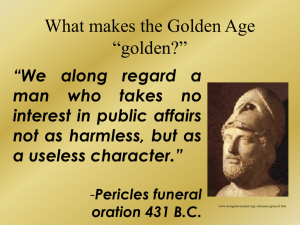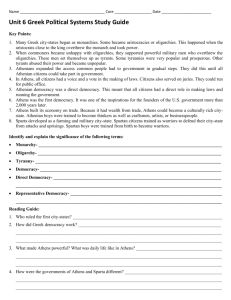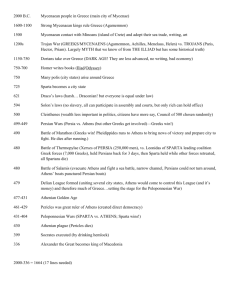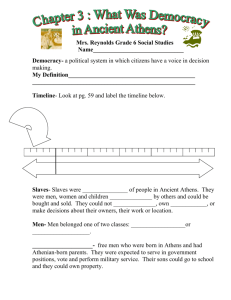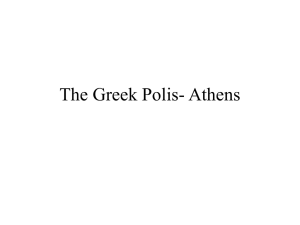Ancient Greece DBQ
advertisement
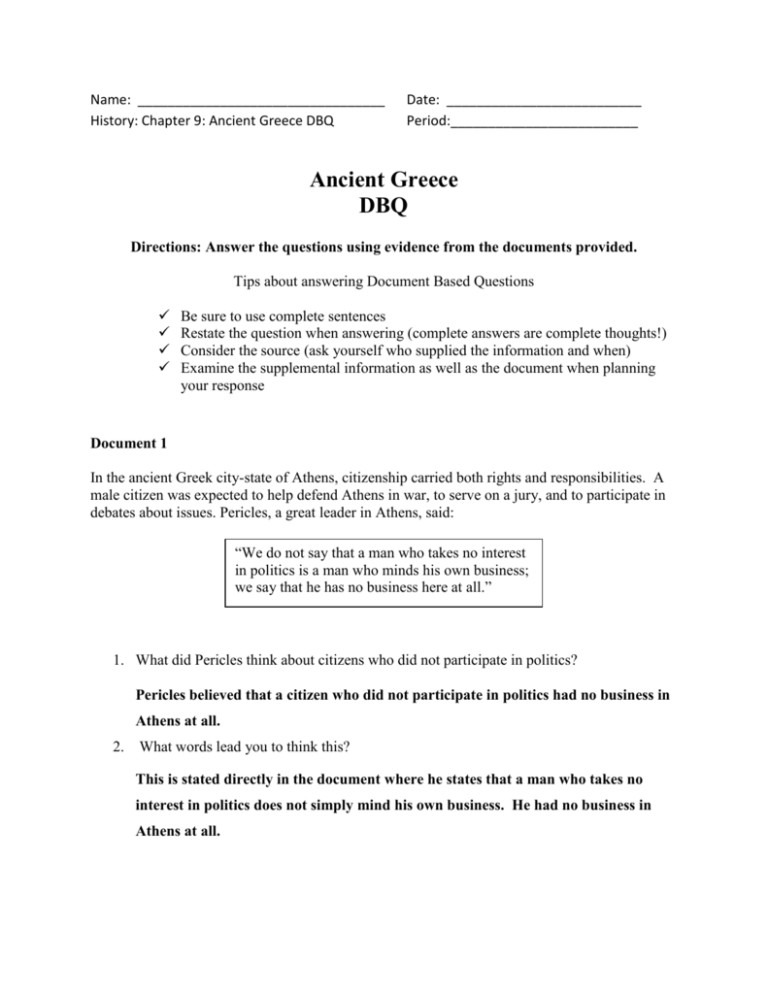
Name: _________________________________ History: Chapter 9: Ancient Greece DBQ Date: __________________________ Period:_________________________ Ancient Greece DBQ Directions: Answer the questions using evidence from the documents provided. Tips about answering Document Based Questions Be sure to use complete sentences Restate the question when answering (complete answers are complete thoughts!) Consider the source (ask yourself who supplied the information and when) Examine the supplemental information as well as the document when planning your response Document 1 In the ancient Greek city-state of Athens, citizenship carried both rights and responsibilities. A male citizen was expected to help defend Athens in war, to serve on a jury, and to participate in debates about issues. Pericles, a great leader in Athens, said: “We do not say that a man who takes no interest in politics is a man who minds his own business; we say that he has no business here at all.” 1. What did Pericles think about citizens who did not participate in politics? Pericles believed that a citizen who did not participate in politics had no business in Athens at all. 2. What words lead you to think this? This is stated directly in the document where he states that a man who takes no interest in politics does not simply mind his own business. He had no business in Athens at all. Document 2 The expression below was supposed to be the parting cry of mothers to their sons. Mothers whose sons died in battle openly rejoiced. "Come back with your shield - or on it.” 3. How does this attitude reflect Spartans values? Spartans based their lives around the military. Mothers expected their children to serve in the army to the best of their abilities, as dying to protect your city-state was considered the highest honor in Sparta. This is reflected in the statement that you should either return home with your shield in hand or die in battle. You should never back down from your enemies. Document 3 Socarates was known for his teachings in Athens. The following is one of his most famous quotes: “I am not an Athenian or a Greek, but a citizen of the world." Socrates, from Plutarch, Of Banishment Greek philosopher in Athens (469 BC - 399 BC) 4. What is Socrates trying to state with this quote? Socrates states that he is neither an Athenian nor a Greek, but rather a citizen of the world. He does not want to be defined by where he comes from, but instead wants to be associated as a citizen of the world. Document 4 Sparta and Athens were the dominant city-states in ancient Greece. 5. How many miles apart were Sparta and Athens? Approximately 100 miles 6. Which city-state’s geography might make it more open to attack in a military battle and why? Note: Either answer is acceptable as long as you can justify it. Sparta’s geography could make it more open to a military attack because Athens is surrounded by a series of islands that help to barricade it from outside attacks. In addition, Athens had the stronger navy, so Sparta would not be able to easily access these barrier islands. Document 5 The small number of citizens made a direct democracy possible in Athens. Type of Democracy Right to Vote Laws Citizen Involvement Comparing Governments Athenian Democracy Direct Only adult males born in Athens Proposed by the council and approved by a majority in the assembly Citizens with voting rights can vote for or against any law American Democracy Representative All citizens, male and female age 18 or over Approved by both houses of Congress and signed by the president Citizens with voting rights can vote for or against the officials who make the laws 7. In Athens, how was a law approved? In Athens, laws were proposed by the council and approved by a majority in the assembly. 8. Which government granted the right to vote to more of its population? Explain. The United States granted the right to vote to more of its population. All citizens of the United States, male and female, 18 years of older can vote. In Athens, only adult males born in Athens could vote, thus making the voting process more restrictive.


